I haven’t been avoiding you lately, I swear. I've just been busy lately, what with putting together all the titles for Chaudiere Books 2007 list (including titles by John Newlove, Andrew Suknaski, Decalogue 2: ten Ottawa fiction writers, the Collected Sex anthology & others…), & finishing that book for Arsenal Pulp (Ottawa: The Unknown City), that Open Letter issue I've been editing, as well as the final touches on the third issue of ottawater… working to get a number of above/ground press items made over the next two months as well, so if you haven’t subscribed or resubscribed yet (I've been slowly mailing packages out over the past few days…)… working on a number of reviews as well, essays & the like, & other various things I haven’t had time for lately (you know how it is)…
I guess this is the time for year end lists & such: I've been slowly teaching myself "Killing Moon" by Echo & the Bunnymen, "Shopping Trolley" by Beth Orton & "Oleander" by Sarah Harmer, the first of which was on this most amazing cd that Katie made me for Christmas (I really think she'd be an amazing dj at some point…), preparing for a new year's eve party at Melanie's house (at Hallowe'en in the same place, Monty Reid & I played a few hours worth of music…). Listening to impressive first albums by KT Tunstall & Emily Haines. You missed an amazing "Christmas Tree" [see Amanda Earl's note abt same]). Did you see how my Aubade & Monty Reid's Disappointment Island both made it on Pearl's 2006 top 5 list? Or Amanda Earl's list? Or the nice things she said abt the Decalogue: ten Ottawa poets launch? Did you notice I had a little chapbook recently come out with Dusty Owl? Not the best reading series in town, but easily the most fun… hopefully they'll be back to their old venue, Swizzles, very soon (the venue had a fire a few weeks back, but should be back on their feet any day now…). I got an email recently from Ottawa's Sean Miller, who has probably been to more events at the ottawa international writers festival than anyone else, apart from the organizers & perhaps even myself, telling me that he's put together a website of his short fiction. There are newish websites, too, for Tim Conley's In Case of Emergency Press & kemeny babineau's Laurel Reed Books. & I've been reading Kate Greenstreet's first book & loving it; why haven’t I reviewed it yet? What the hell is wrong with me?
Brockwell got me a first edition copy of Ralph Connor's The Man from Glengarry: A Tale of the Ottawa (1901); pretty funny. I'll actually have to read it at some point. The only Connor stuff I'd previously read is Glengarry School Days: A Story of Early Days in Glengarry (1902), & of course, his Postscript to Adventure, The Autobiography of Ralph Connor (1975). He was Canada's best-selling novelist circa 1900, selling three million copies of one book, for example, & he arrived right near my house. Want to, for the sake of this book-length Glengarry essay I've been writing for years, read his Torches Through the Bush: A Tale of Glengarry (1934) at some point, talking about the religious revivals in my area in the 1860s that brought about the "Gordon Church" St. Elmo Congregationalist Church that Connor's (pseudonym for Rev. Charles Gordon) father was minister for. Who can keep up with all of this learning?
Windsor ON: It's been a few years since RAMPIKE moved from northern Ontario down to the southern-most tip of the entire country, so you might not necessarily know Karl Jirgens is down there teaching at the University of Windsor (along with Louis Cabri, Nicole Markotic, Susan Holbrook & others). The brand new issue, Vol. 15/No. 1, is called a "FRANK DAVEY SPECIAL," & is considered part of the celebration that began with the symposium a couple of years back at the University of Western Ontario when Davey retired [see my previous mention of the Open Letter issue on same here], & includes both pieces from the conference & otherwise an interview with Davey, along with work by Jeanette Lynes, Paul Hegedus, Cabri, Markotic, George Bowering, Matthew Holmes, Paul Dutton, Stan Rogal, Charles Bernstein, Gregory Betts, Darren Wershler-Henry, Carl Peters & Joyce Carol Oates, among others. Apart from the Davey & Bernstein interviews, & Betts' "The Geopoetics of TISH (in the Canadian Context)" piece, are the two poems by Nicole Markotic (isn't she due for a third poetry collection sometime soon? & have you read her wonderful novel about silence?), including this one:
succular
succumb to Winnipeg
suck on combs pegged to winter
snap crackle popsicle python
paste the cracks like clear snake facials
I disguise my wry face into no one knows
I'd die to be your guy -- it's fine to know NO
dented rhyme misprints the chance
tendency to hint at a margin miss
set me up for fall / drop / launch / crash
test the pump four times in autumn / droops / leaves / crush
flip the last page then duck
lift past the final peg due to age or elbow tucks
rearview mirrors look closer than a book jacket
cute ears press across kooky thumb tacks
kumbayahead past reasonable history or 60s tunes
come to jaded poet reading his ability as tombed
or jack posts by tucking fliers post midnight
then -- sigh
Vancouver BC: Following his Governor-General's Award winning poetry collection Surrender (2002) is Vancouver poet Roy Miki's There (Vancouver BC: New Star, 2006). The author of a number of other books including the non-fiction Redress: Inside the Japanese Canadian Call for Justice (2005), as well as three previous poetry collections, Saving Face: Selected Poems 1976-1988 (1991), Random Access File (1995) & Surrender (2002), he spent years editing West Coast Line magazine, & has also edited work by the late Toronto poet bpNichol, Vancouver writer George Bowering & the late Vancouver poet/artist Roy Kiyooka. Miki's There feels less a collection built out of a whole than a series of extended parts, writing poems that respond to the world around him as opposed to being written out of that same world, responding to his own work in the Redress movement, his history in Winnipeg & returning there (his family was moved to the prairies from the coast during the Second World War), a trip to China, & the previous works of Roy Kiyooka, as he begins in the piece "This Side," writing:
This is the unspeakable screen where he sought to protect the
inquiries that riddled one's childhood.
He was born in a neighbourhood where the streets, lanes, and foot-
worn paths of the park returned on themselves.
The provisions of memory, always on alert for the anomalous
register, cloaked the bone rush of his awakened tensile regions with
a notorious green thumb.
It resembled a casual photo seen years later in the multitudinous
chambers of a lexicon in crisis.
What it incarnated then – the spooks removed from the tongues in
check – came across the divide as a designer storefront for ripe but
modified melons.
In what was described as a salamander like manoeuvre, even after
prolonged decades, the resonance, or call it the abrasive whiskers,
would sneak up on his reveries at the most anticipated of times. Dub
it then the installation of the so-called syllabic entourage.
What tissues assumed the audible signed on as compensation for
the displaced get out of childhood free card. Each album cushioning
the aerated passage of family matters enveloped the alleys of his
peregrinations.
I find it interesting, for example, that Miki will work capitals at the beginning of lines but still work the lower-case "i," working a variant, perhaps, on Kiyooka's own sense of "inglish." Working more a series of ongoing occasional than individual collections, Miki's poetry seems instead to be working one large life-long project, accumulating book after slow book.
There
There is the location
in front of the computer
The technology dissipates
and the ache of the temporal
exudes a fine mist that conjures
the diaphragm of rolling hills
minted fevers that produce
crab apples by the bushel
Tart folds in the evening walks
on the boardwalk the ferris wheel
whirls in overdrive as the street
talk moves the crowd past (85)
St. Catharine's ON: Gregory Betts seems to have taken over parts of Cubicle Press, Grey Borders etcetera down there in that part of Ontario, with the most recent publication being The Din (2006), subtitled "interviews with young canucks, poets, and other fragilities," with interviews with Calgary poets/editors Jason Christie [see my review of his first book here] & Jill Hartman by Angela Chatterji and Tara Yelland, originally conducted as part of a class at the University of Toronto (when Betts was teaching there). There has been talk of perhaps finding homes for a number of the interviews that were conducted, & Betts has only included two here; will there be more? Talking about incoherence, Jason Christie says at the end of his interview:
Often in my writing what seems incoherent will have some internal necessity. I sometimes try to achieve a coherence through the musicality of sequences using internal, slant or end rhyme, assonance or consonance, or by referring back to a concept in many different ways and from different viewpoints, sometimes by using the same sequence over and over as anagrams. Lately I've been obsessed with noise. I find so much of popular music to be banal and irritating. I really feel the need to push for something non-marketable. John Cage's famously loud silent piece 4'33 is an example of a resistance to produced sound as product. If you've seen the movie Pootie Tang then you've seen an updated version of this idea. Pootie Tang is a character in the movie who recods a song composed of silence. When it is played on a radio station there is the slick, over-produced beat leading into the piece, then silence. Everyone that hears the song, stops what they were busy doing and turns to the radio. It is a powerful moment in a hilarious film about our immersion in media so much so that we only notice it when the flow is interrupted and we come up for air into silence. R. Murray Shaffer conducted research into the gradual increase in urban noise, the increasing presence of abstract noise in our cityscapes. He coined the termFor details on this or other publications, submissions & upcoming events, email editors@greyborders.com
"soundscape," but that is no longer enough to contain the noise that inflects our life. It is no longer just noise in sound. Noise is a concept in Information Theory that is used to identify anything which distracts from a signal. This can be something useful such as a cry for help interrupting a conversation, or damaging such as the sound of a jackhammer interrupting a conversation. In both cases, following the guide of Information Theory, the interruption of the conversation is considered noise. In a world where we are inundated by the need for efficiency noise is counterproductive behaviour or activities to a streamlined work experience. Anything that distracts a worker from a task is noise. Coherence functions in a similar manner. Coherence is a function of understanding and I'd like to believe that in some instances my poems can disrupt that understanding long enough to call attention to the plurality and
ecstasy of noise.
Phoenix AZ: After other such as bpNichol, American poet Sheila E. Murphy has been sending out her Christmas poem for years now [see my previous note on bpNichol + Christmas here, from the Grain magazine issue]; I'd actually been wondering where it was when it appeared in my mailbox. I know Gil McElroy used to do the same; what happened to his?
On the Threshold of the Year 2007
Any lifetime is enormous in symphonic breeze. Plurality, a learned
reprise, draws love from dream of present tense spectacular, where winter
is a precondition for the needed healing. Even a clipped flower that survives
on empathy imposes blossom from a crystal vase. The laureate assigned to
tether faith may improvise new midnight at the moment ashes on the willing
forehead fade.
As distant soldiers bypass life support, a close-up of our breathing
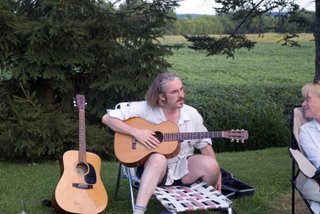 in my sister's backyard, August long weekend, 2006
in my sister's backyard, August long weekend, 2006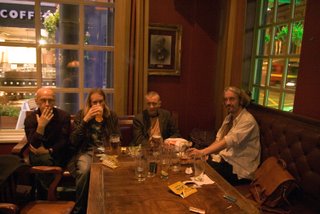
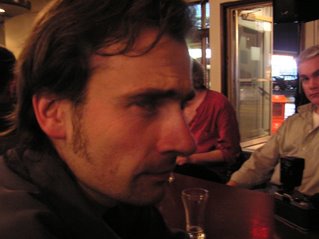
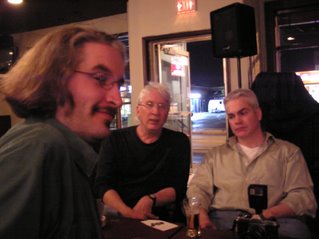
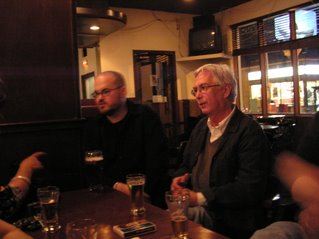
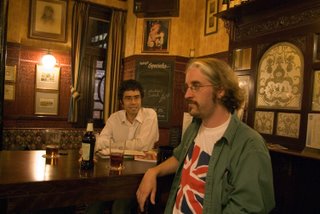 Finally, a picture with
Finally, a picture with